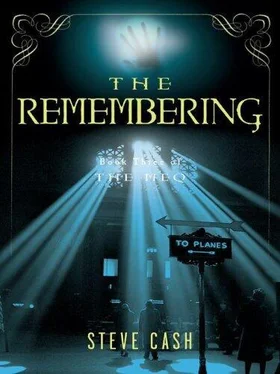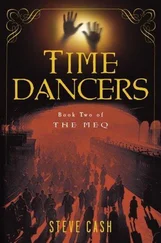“Everything?” I asked.
“Well,” she said, hesitating. “Most of it.”
That same evening, Cardinal informed all of us about Blaine Harrington and his obsessions, one of which was his pursuit of a new weapon to use against the Soviets; a human weapon with superhuman powers. After his sadistic study of Zuriaa, then seeing Opari and witnessing a little of what she could do, he was now convinced the Meq and whatever is in our blood could be that weapon. Cardinal also told us what Valery looked like, but very little else. He said Valery had only been seen rarely since 1945, and with a network of agents who were equally invisible, he was impossible to track or predict. The CIA and Army Intelligence had not yet been able to “turn” anyone who had ever worked for him or with him. All Soviet agents denied his existence. When Cardinal finished his briefing, he asked if we needed anything. Geaxi asked if he might assist two of us in entering Russia secretly somewhere near the Sukhoy Kurdzhips River. He said it could be arranged through Kerem and his Black Sea contacts. Cardinal then told Mowsel he would examine him the next day and we ended the late night with Mowsel and Cardinal discussing various ocular trauma and the advances in modern ophthalmology.
It cost us $3500 plus the cost of fuel, but two nights later Geaxi and I were on board a Russian-built Mi-1 helicopter piloted by a Turkish smuggler named Babesh. We flew through the night, refuelling twice along the north coast of Turkey, then making the long hop across open water at an altitude of no more than fifty feet, finally landing outside the small coastal town of Tuapse. Babesh never turned the engine off and left as soon as Geaxi and I were clear of the rotor blades. It was not a pleasant trip, yet dawn was breaking, we were safe, we were in Russia, and we were not far from Zuratumi.
Geaxi said, “Do you feel like a spy, young Zezen?”
“No. I feel more like a criminal.”
“Even better,” she said with a laugh.
The air was warm and humid, and we walked south at a quick pace for nearly three hours. Geaxi seemed to know exactly where she was going. She told me she had spent some time in the region two hundred years earlier and even though many of the roads were now paved, they were the same roads leading to the same places. By late morning we had reached an intersection about thirty miles north of Sochi. Geaxi paused and looked around. An old school bus was parked off to one side. It was painted in stripes of at least six different colors, which were all fading and chipped. On both sides in bold Russian letters were the words THE GREAT ZHORDANIAS. As we approached, the doors of the bus opened and a tall, badly scarred, white-haired man in his early seventies stepped out. It was Giles Xuereb. Speaking Maltese to Geaxi, he said, “I was beginning to worry.”
Geaxi shrugged, then adjusted her beret and smiled. Also speaking Maltese, she replied, “Not to worry, old friend. After all, the show must go on.”
Giles looked down at me. A moment or two passed.
“Hello, Giles,” I said.
“Zianno … an unexpected pleasure. How long has it been?”
“Thirty-two years.”
“Yes … yes,” he said, pausing and glancing back at the school bus and the faces of a dozen Zhordanias staring out the windows.
“It is good to see you again, Giles. It is good to see you alive,” I added, both of us knowing I was referring to the Fleur-du-Mal.
He put his index finger to his lips. “Shhh,” he whispered, then laughed out loud. He turned and gazed down the road to the south. Traffic was sparse, as it had been all morning. “Come with us. You must be hungry following such a long journey. We will find something decent to eat in town. After that,” he said, winking at both Geaxi and me, “we have a show to do.”
On the drive into Sochi, Giles introduced Geaxi and me to the Zhordanias, one by one. The youngest among them was twelve years old, a wide-eyed boy named Noe, and the oldest was in his mid-forties. His name was Giorgi, and thirty-two years earlier he had been the boy Giles first saw tumbling through the air upon his arrival in Zuratumi. Now Giorgi was the leader of their troupe and the anchor of the flying four-tiered human pyramid, the highlight of their act and the feat for which they were famous. When Giorgi was told that I was American, he became very excited and insisted I sit next to him. “We will talk,” he said, “and Giorgi will grow his English.”
We stopped for a wonderful two-hour meal at a restaurant called the Black Magnolia. Giles ordered osciotr caviar, along with zakuski , which included pickled herrings, cucumbers, cabbages, and beets, then ukha , or clear fish soup with potato piroshki stuffed with wild mushrooms, then fried filets of salmon with dill sauce and cucumber, and finally pumpkin oladi , or pancakes, with honey from the Altai Mountains. “Normally, we drink good Russian vodka with all this,” he said. “But not today. Today we shall drink good Russian tea.” While we ate, Giles described for Geaxi and me the sphere and the room in which it was kept. He said we would have to devise a plan once we arrived, depending on where we were to perform and the amount of security around us. “Whatever you do, you must do it quickly,” he warned. “If you are caught, all of us, including the Zhordanias, could be punished severely. We could even ‘disappear.’ It is not uncommon.” Geaxi and I nodded our understanding. After the meal, full and in high spirits, we boarded the old school bus and continued on toward our destination. It was three o’clock in the afternoon and our show was scheduled to begin at six o’clock sharp. There was no time for doubt or worry. I had to trust that what Geaxi taught me in just two days about acrobatics would be enough.
Nikita Khrushchev’s dacha was surrounded by a ten-foot stone and concrete wall with a heavy ironclad gate at the only entrance and exit. There were several outbuildings and two guesthouses, and the entire estate faced the shores of the Black Sea a half mile away to the west. To the east the snowy peaks of the Caucasus Mountains loomed in the distance. Fully armed and uniformed soldiers guarded the gate and patrolled the wall. After being told to stop, we were asked to step out of the bus while two of the soldiers, along with a large German shepherd, searched the interior thoroughly. Giles talked softly with the captain in charge, but none of the rest of us spoke and none of the other soldiers smiled or said a word. Twenty minutes later, we were allowed inside and directed to a service entrance at the rear of the huge dacha.
At least two dozen black Zil limousines lined the gravel driveway. Most of their drivers were gathered together smoking cigarettes, and as our noisy, multicolored school bus passed by, they all turned their heads to watch. At the service entrance, two men in dark suits were waiting for us. We were led through the kitchen and into a sparsely furnished, unused banquet hall, which was to serve as our dressing room. I could hear music, loud voices, and laughter coming from another big room not far from ours. One of the men asked Giles if we needed anything. Giles answered no, then changed his mind and said, “Perhaps some vodka … for celebrations afterward.” The man gave him a long, deliberate look, then said he would see to it and both men turned and left the room, locking the door behind them.
The costumes of The Great Zhordanias were each handmade and combined the same rainbow of colors that were painted on the school bus. Since the youngest of them, Noe, was about our height and weight, Giles had brought two more costumes in Noe’s size for Geaxi and me. As everyone began changing their clothes, Geaxi quietly asked Giles, “Where are we performing?”
Читать дальше












